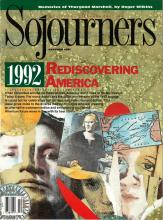As Sojourners went to press (in mid-August), South Africa was still reeling from almost daily revelations about the government's covert support of the Inkatha Freedom Party in order to undermine the African National Congress.
The disclosures have jeopardized the entire negotiation process toward a new, non-racial South Africa - and questioned the integrity of both the government and Inkatha as active players in those negotiations. In addition, they have added weight to the demand of South African church leaders and others for a broad-based interim government to assume leadership of the country before negotiations continue.
"Any system of government or policy based on lies can have no moral legitimacy, and must ultimately topple," stated the South African Council of Churches (SACC) in response to the disclosures. "We believe the government has demonstrated that it cannot be trusted to have oversight of the transition process."
The government is also facing mounting evidence that South African security forces have fueled the violence between supporters of Inkatha and the ANC, which has claimed more than 1,500 lives. The SACC has called for an independent commission of inquiry to be established, with foreign jurists invited to assist in the investigation.
BEFORE THE COVERT FUNDING scandal broke, the main story in South Africa was the Bush administration's decision to lift economic sanctions.
Most church leaders both in South Africa (including the SACC) and in the United States criticized the decision as "premature," saying all the conditions had not been met - including the release of all political prisoners. (The Human Rights Commission in South Africa reported in late June that at least 850 political prisoners remained in detention.)
Read the Full Article
